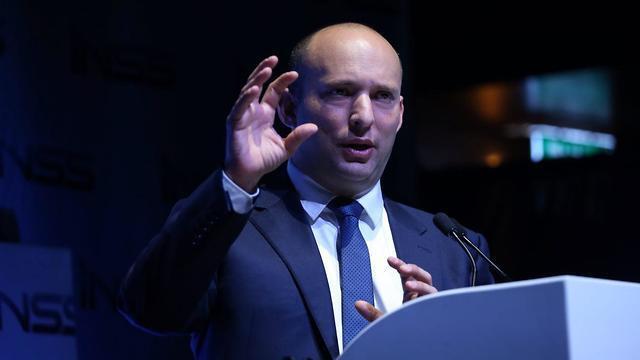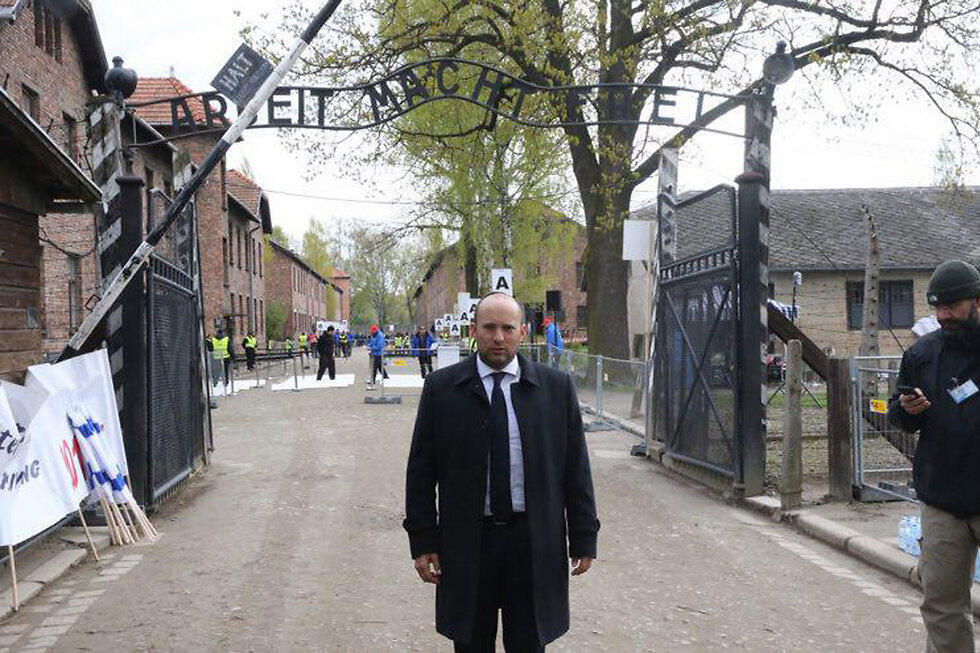Getting your Trinity Audio player ready...
Poland canceled Education Minister Naftali Bennett's planned visit to the country Monday after the Bayit Yehudi leader accused the Polish people of complicity in the murder of Jews during the Holocaust amid uproar over Polish legislation that would outlaw exactly that.
Bennett was scheduled to visit Poland next Wednesday to address Polish students and meet with Deputy Prime Minister and Minister of Science and Higher Education in Poland, Jarosław Gowin.
Ahead of his visit, Bennett announced that "in Poland, I will make it clear: the past can't be rewritten, the future should be written together."
He noted that while thousands of Poles helped Jews during the war, many others participated in their persecution. "I am going to speak truth, where the truth took place," he said.
This prompted the Polish government to cancel the visit, with spokeswoman Joanna Kopcińska clarifying Monday evening that in the wake of Bennett's remarks, "there will be no such visit in Poland."
Bennett said he was "honored" by the cancelation. "The government of Poland cancelled my visit, because I mentioned the crimes of its people. I am honored. The blood of Polish Jews cries from the ground, and no law will silence it," he stated.
"Now, the next generation has an important lesson to learn about the Holocaust of our people, and I will make sure they learn it. This decision by the Polish government will be a major part of the lessons of the Holocaust, even if they intended to achieve something else."
Bennett went on to admit that "indeed, the death camps in Poland were built and operated by the Germans, and we cannot allow them to evade responsibility for these actions," but reiterated his assertion that "many Polish people, all over the country, chased, informed or actively took part in the murder of over 200,000 Jews during, and after, the Holocaust."
"Only a few thousand people, Righteous Among the Nations, risked themselves to save Jews. That is the truth. I agreed to a dialogue based on truth. The Polish government chose to evade this truth. No legislation will change the past," he said.
After Bennett's statement, the government spokeswoman said the Polish side is "convinced" that soon the two sides will agree on a date to meet.
"We will certainly talk about our common history soon," Joanna Kopcinska, the spokeswoman, said in a statement sent to Reuters.
Kopcinska said that Poland would like to talk about "the huge involvement of the Polish nation in saving Jews during the war, because under the conditions of German occupation, people of Jewish origin could hardly be saved without the help of Poles."
But she said Poland is also ready to talk about "the painful cases when people behaved despicably" and turned their neighbours in to Germans.
"(The bill) does not limit such discussions, but aims to fight against false accusations against Poland for its complicity in the Holocaust."
Polish Foreign Minister Jacek Czaputowicz responded to Bennett's remarks by saying that the part of his speech "which speaks of the need for dialogue, is of course welcome and is consistent with our position," but added that "to mention the Poles as active participants in the Holocaust is an incorrect and undesirable distinction."
"We must seek to reach agreements, to talk and to resolve the dispute," he added.
Czaputowicz said Bennett's visit has not been planned by the Polish government. "Minister Bennett declared readiness to come and his words do not help the dialogue at this stage and, at the same time, show that there are different voices in Israel," Czaputowicz told broadcaster TVN on Tuesday.
"Part of the public opinion, some politicians want to accuse Poland of complicity in Holocaust and this is a problem which has arisen," he added.
The bill proposed by Poland's ruling conservative Law and Justice Party calls for fines and prison sentences of up to three years for purposely trying to attribute the crimes Nazi Germany carried out during the nearly six-year occupation to the Polish nation as a whole. It passed in parliament last week and is awaiting a decision by President Andrzej Duda over whether to sign it.
"I hope that an agreement will be reached still ahead of the president's signature," Dziannik Gazeta Prawna daily quoted Anna Azari, the ambassador of Israel to Poland, as saying.
"If we are to talk, then it makes sense before the legislation process is finally completed," Azari said.
Duda is likely announce his decision on the bill on Tuesday, RMF FM radio said.
Poland's government has argued that it is fighting against the use of phrases like "Polish death camps" to refer to the camps Nazi Germany operated on Polish soil. Poland has also sought to highlight its own suffering at the hands of the Nazis.
"I think that the bill is precise and does not require a change. I do not know what the president's decision will be. Let's wait a few hours. We are all tired with this issue," Foreign Minister Czaputowicz said.
The bill sparked outrage in Israel, raising tensions with a close ally. Israel sees it as an attempt to whitewash the role some Poles played in the killing of Jews during World War II.
The bill has also drawn criticism from the United States and condemnation from a number of international organizations as well as Polish minority groups.
Poland, which had Europe's biggest Jewish population when it was invaded by both Nazi Germany and the Soviet Union at the start of World War Two, became ground zero for the "final solution," Hitler's plan to exterminate the Jews of Europe.
More than three million of Poland's 3.2 million Jews were murdered by the Nazis, accounting for about half of the Jews killed in the Holocaust. Jews from across the continent were sent to be killed at death camps built and operated by Germans in Poland, including Auschwitz, Treblinka, Belzec and Sobibor.
According to figures from the US Holocaust Memorial Museum, the Nazis also killed at least 1.9 million non-Jewish Polish civilians.
Reuters and the Associated Press contributed to this report.



